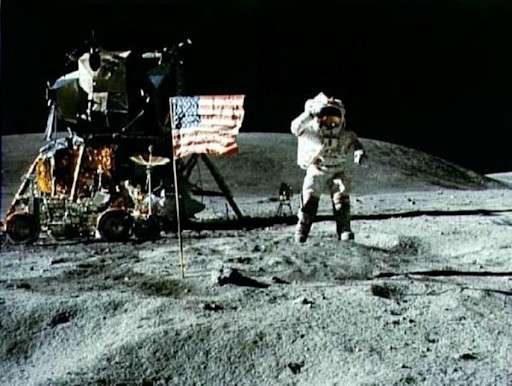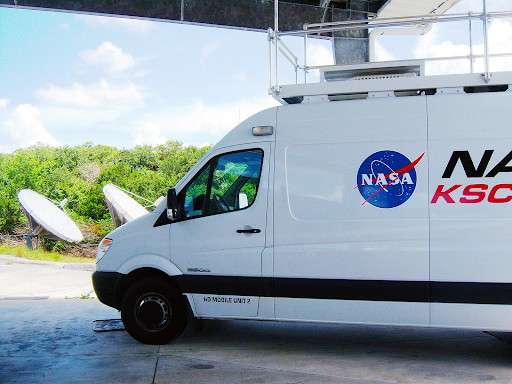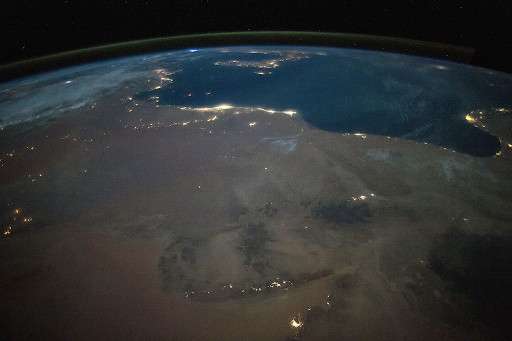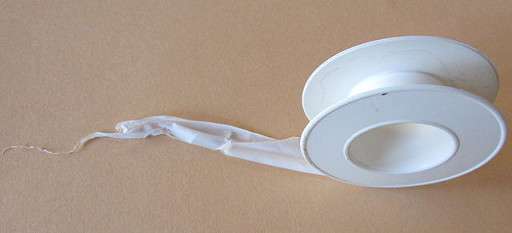The National Aeronautics and Space Administration (NASA) has been a source of pride for the United States, but it was especially strong during the Cold War. This sense of pride culminated on July 20, 1969, when the United States landed a man on the moon and essentially won the space race against the Soviet Union. Prior to that historic moment, when the world officially recognized the United States as presumptive leader in space, the U.S. government saw a need to promote NASA’s viability and its importance to the rest of the world. This took different forms; in Northern Africa, many people gained an appreciation of the American space program through Glenn Cella’s efforts.
In 1967, Glenn Cella took an usual Foreign Service detail assignment with the U.S. Information Agency (USIA) to NASA to leverage his scientific background and Arabic and French language speaking skills. This allowed him to learn the details of traveling to space and all that encompasses it. Cella witnessed a Delta Launch, met real astronauts, and learned everything he needed to create a presentation for the people of Northern Africa. He joined the Space Mobile Program, which allowed him to visit different regions to give his presentations.
Glenn Cella went to Libya, Tunisia, and Morocco at a time when these predominately Muslim countries were particularly high-strung, as the Six-Day War had ended a few weeks prior. The Space Mobile Program not only provided the perfect opportunity to promote the space program, but allowed him to improve relations between these countries and the United States. Cella would go to these countries and give presentations at military academies, universities, secondary schools, general audience groups, and on national television. His language skills were good enough that locals often didn’t believe he was American. This allowed him to communicate with local and high ranking officials who were sometimes beyond the traditional reach of other FSOs who preceded him. Moreover, he gained enough intrigue in the media to become a mini celebrity.
In this “moment” in U.S. diplomatic history, we see that Glenn Cella successfully engaged the interest of the people from these African countries, and gained popularity throughout his travels.
Glenn Cella was interviewed by Charles Stuart Kennedy on July 18, 2006.
Read Glenn Cella’s full interview here.
Read more about North Africa here.
Read more about the U.S. in space here.
Drafted by Nathaniel Schochet
ADST relies on the generous support of our members and readers like you. Please support our efforts to continue capturing, preserving, and sharing the experiences of America’s diplomats.
Excerpts:
“I met several of the astronauts including Alan Sheppard. . . .”

Introduction to NASA:
Q: You’re off to the United States to go to NASA to learn how to fly to the moon. How did you find that? Was this a completely different culture for you?
CELLA: Well, I had been in the military. Of course, the original astronauts were all military guys and the operational side of NASA was organized in ways that would be fairly familiar to someone who had had some exposure to the military. It was a very good program that was organized for me. The NASA space mobile was run by a contractor. The contractor made all the arrangements, the vehicle, the models that went in it, the text to go with the presentation and the training of the presenters. And in my case in late November or December of 1967, I spent about three or four weeks in a program developed by the contractor. I went to the Goddard Space Center and down to Houston and to Cape Canaveral. As I met several of the astronauts including Alan Sheppard, one of my favorite Foreign Service mementos is a signed picture from Alan Sheppard wishing me a good trip. I thought that was fun having an astronaut wish you a good trip. I got to meet these folks as I say, three or four astronauts one on one and talk at great length.
You got a real education, everything about the program from beginning to end, the food, the plumbing, and rocketry involved, preparations for the reception when the astronauts came back from the first moon landing. They didn’t know whether they would bring back microbes that could wipe out humanity, that sort of thing. I got to see a Delta launch which was pretty small beer compared to a Saturn Five but still at Cape Canaveral for a launch. It was all very interesting and that was well done. During the six or seven months when I was doing my lectures I don’t ever recall getting hit with a question where I didn’t feel at least moderately prepared to give a reply. I mastered enough of the basic science and knew enough about how we would put a man up there and what he would do up there and what he was likely to find and all that sort of thing. That part, the NASA experience training part, was very well done and it was an experience that I value. I learned all kinds of things. I got to talk to their astronomers and their geologists, usually one-on-one in their labs with no real time limit. I enjoyed that thoroughly.
I came away with the feeling which is with me to this day. Let me go back a step. I said this to Alan Sheppard who treated me very cordially. It turned out we had some things in common, the fact that I was an ex-Navy guy, and he liked that so we hit it off very well right off the bat. One question, I said, “You know, I’m doing a tour in North Africa. A lot of people there are pretty poor and lead pretty dismal lives. What do I tell some poor North African who wants to know why the hell we are spending all this money to go to the moon when millions upon millions of people on earth don’t have enough to eat?” His reply to me and this is not meant to be disrespectful to Alan Sheppard, he’s a very good man, and I like him a lot, I have tremendous admiration for him, “Have they heard of Teflon?” I said, “Well, they probably haven’t heard of Teflon and even if they had it wouldn’t do much good because he sure as heck wouldn’t have a Teflon pan even if he had an egg to fry in it.” My point is that this massive effort and it boils down to Teflon. Of course, it doesn’t.
“I don’t know when they decided to do North Africa”
Why North Africa?:
CELLA: Well, I don’t know why the area. I think the decision, even after the Six Day War maybe it was to try and build some new bridges or strengthen some old ones. I don’t know when they decided to do North Africa. Again, this was the U.S. Information Agency program.
“A friend of mine was watching me on television in a café I think in Casablanca. He told me afterwards a really fierce argument broke out about how I could not possibly be an American.”
The Advantage of Language Proficiency:
CELLA: No. There was no operational link. I was tapped for the program or Shanghaied for it right after the Six Day War. I could see somebody saying hey, everybody’s fascinated with space, it’s the good side of America, and we’re the world leader in the field, so why not? I have no idea what the substantive justification was for putting the program in North Africa. It was relatively cheap to do, because I was being paid the wages of an FS-05 and the models already existed and all it was was a truck model. You had to buy the gasoline and as we went from country to country I had a local driver. And that was it. So it was a relatively inexpensive program to run.
There was a fairly high level of interest. I gave the presentation on national television in Morocco, at several military academies, several universities, lots of secondary schools, lots of general audience groups. I would say in general, the audiences were fairly engaged. Whether it was worth doing, who knows? Part was the fascination of seeing an American try to speak their impossible language. There’s no question of that. That had at least something to do with it.
When I gave a presentation on Moroccan television it was the last night of Umm Kulthum’s tour in Morocco. Kulthum, as you know, is Lebanese born. I believe she lived in Egypt back in the ‘50s or ‘60s or ‘70s and probably before the ‘50s. She is I suppose the best known female Arabic language singer in the Middle East. She would be in concerts broadcast from Yemen to the Pillars of Hercules. She would start out at 10 o’clock at night and it would go on until two or three in the morning with a little bit of a break to catch her breath. She was huge, I mean, this is Ella Fitzgerald and Diana Warwick and Kate Smith all rolled into one.
Q: We’re talking about hefty women singers of an earlier era.
CELLA: Mainly in Arabic, mainly love songs. She’s winding up a tour in Morocco and is going to be televised live starting about at 10 o’clock at night. And at midnight they are looking for a filler. What are we going to do while she’s not on stage? So I did my space lecture complete with my liquid oxygen experiment and all my models and the whole works. Thank God I wasn’t doing it live on stage. I taped it that afternoon for Moroccan television. Well, that program was the single most watched program in the history of Moroccan television until that time. Afterwards wherever I went in Morocco or western Algeria which picked up Moroccan television it was common for people to come up to me and ask me about Kulthum what kind of person she was. They thought I was part of her troop.
A friend of mine was watching me on television in a café I think in Casablanca. He told me afterwards a really fierce argument broke out about how I could not possibly be an American. This had to be a CIA trick and that I was an Egyptian or maybe a Syrian. I was flattered by that story. It was really a fierce argument. I couldn’t possibly be an American. The Arabs have this notion that no one could speak their language at all. That’s not too far-fetched but there are a few non-Arabs who are fairly proficient. You mentioned one of them earlier, Hume Horan who is a terrific Arabic language specialist.
“Mr. Cella, you should understand one thing. It’s a good school, we have good students, but these are probably the toughest group you can ever expect to give a presentation before.”
The Presentations:
Q: Tell me, how interested, particularly at the high school level, the young people and in college were in this program and with the science and the adventure and all?
CELLA: I’m trying to think. As I said, I ran into a fairly high interest level. This evades your question a bit. There are lots of things I could tell you about this program beyond what I’ve already said. I’m in Libya that’s where we begin the program and gave my first presentation. I get there about two weeks before I’m due to give my first presentation, and I marry up with the fellow who had run my NASA training program for the independent contractor. He comes out to Libya now to get things started, to get a supply of liquid oxygen, experimental liquid oxygen, and various other things. I had never seen a presentation given. David Newsom was Ambassador at the time and my NASA contractor mentor gave a program at the Ambassador’s residence for about 50 invited guests so I got to see one time how you do all this stuff, what do you do with the model, how do you run the liquid oxygen experiment. Meanwhile, I’m spending a couple hours a day with a local radio announcer going through my Arabic script to make sure I was using words that a Libyan audience would understand and correcting my diction and accent and that sort of thing. When I moved to a new area I always got somebody from that area to help me with the text which was basically classical Arabic. I would modify it to meet local usage. When I first get there I said to the USIS guy, please start me off with the softest audience you can. After all it was only six months after the Six Day War, its pre-Qadhafi and the Americans are in pretty good shape in Libya, but nonetheless, until I really build up my confidence level I want to start off with, you know, the Little Sisters of the Poor or the Tripoli equivalent.
A couple of weeks go by and my first presentation; it’s a boys’ secondary school. It’s a very highly regarded school in Tripoli and the principal or the headmaster, I meet with him 10 minutes before the show was due to start. I set up my exhibits and models and it was in an amphitheater that looked like it was out of the Currier and Ives print, the discovery of ether, high, row after row of seats and the audience was closing in on you down in the middle of it.
The headmaster said, “Mr. Cella, you should understand one thing. It’s a good school, we have good students, but these are probably the toughest group you can ever expect to give a presentation before. They have a tendency to be a little, in essence you’re going before a collection of potentially very boisterous smart asses. So, I start the program in Arabic. There were catcalls and people yelling things. They were saying we can’t understand you, who knows what they were saying? They were real smart asses. This is a true story. I feel I am engaging in self-flattering which I may be prone to do. The headmaster can’t bring them under control. Absolutely cannot, so there was a racket, again it wasn’t of riot proportions, I didn’t feel my life being threatened, but you know, a bunch of 15, 16-year-old kids yelling things out. There were, I guess, the audience 120, something like that, fairly good-sized, and the amphitheater setting magnified the noise. The headmaster grabs the microphone and tries to quiet them down. Total failure. So I say as loudly and as firmly as I can call, “Gentlemen. I’m very grateful to you, for the warmth of your reception this morning.” I’m saying this in Arabic and I said, “I’m going to repeat it in English.” And I say, “Apparently some of you feel that my Arabic is deficient. And you’re right. But I think it’s a hell of a lot better than your English. But if you can prove me wrong on that. So either you speak in English or you speak in Arabic but either I speak or you speak. If you’d rather do the talking fine, I’ll pack up and leave. It’s your choice, we do in Arabic or English and either I talk or you talk.” That quieted them down, they said they wanted me to do it in Arabic, and I went through to the end with no further problem. Afterwards, the headmaster said to me, “I’ve never seen anything like that, the way you established control over the students. That really amazed me.
A lot of their questions, I don’t remember now, when are you going to go? What happens if you can’t leave them? What if they can’t get off? The program consisted of explaining how rockets worked, explaining the purpose of the man on the moon program from Mercury through Apollo and how the various missions were accomplished and how is the series of building blocks that culminates in walking on the moon. What happens if he gets there, we put a man on the moon but he can’t get off the moon? How do you keep from burning up when you reenter the Earth’s atmosphere? Food, how do you, how can you, carry enough food. I had samples, mockups, actually fakes of space foods I could hold up and say well, explained freeze-dried and that sort of thing.
“I found, of course, that in the early years of Islam, Arab scholars have made tremendous contributions to our scientific and cultural heritage.”
Importance of the Space Program:
In regard to reactions, more I think it varied more on the basis of social class and education level. I did all kinds of audiences including a camel market in Guelmim, Morocco. Sure, there were differences, there are fundamental differences between Libyans and Tunisians and Moroccans that are there. Looking at the narrow perspective of a reaction to the U.S. space program and my presentation on the same, the same classes, the same education levels reacted more or less at the same level of sophistication. One of the interesting things, really interesting, and an insight into the problems in the Arab world and an insight into where all this radicalism comes from. Getting ready for this program I did a fair amount of research. I got a dictionary in several languages including Arabic space terms. The word for satellite was pretty basic to my presentation. There were several ways of saying it in Arabic, neither related to the other. That’s one of the problems with the Arabic language. It’s great for describing sunsets but I wouldn’t want to try to build a suspension bridge in Arabic because of the linguistic peculiarities. Anyway, I did a fair amount research including reading up on Arab contributions to learning in general and science in particular. I found, of course, that in the early years of Islam, Arab scholars have made tremendous contributions to our scientific and cultural heritage. And I found that including educated Arabs, they had no idea of their own history. Not all of them, but lots of them. One of the reasons that I did all this research was to enable me to wind up my presentation which I did what it in whatever language I was using. So, ladies and gentlemen roughly a year from now when you hear or watch it on television that there is a man walking on the moon or you’re watching it on television and see a man walking on the moon, he may have an American flag on his space suit and it may be an American rocket that got him there, an American vehicle gets him back, but humanity in general has contributed in a very real way to that man being there, including the Arabs, which was a pretty cheap way of flattering the audience but I meant it. It was a lesson I wanted to leave these people that this was truly was a global enterprise and an enterprise that all humanity had a stake in, a very real part.
“Wherever I went I had to find a supply of liquid oxygen”
The Experiment:
With regard to the space mobile program there are lots of anecdotal stories I could tell. One or two kind of funny ones; I used to do an experiment where I would use balls of cotton soaked in rubbing alcohol in a Pyrex measuring cup, I guess quart size measuring cup. I would set them on fire and add some liquid oxygen to show the difference between something burning in the normal atmosphere of the earth and something burning in liquid oxygen. There’s quite a dramatic difference. Wherever I went I had to find a supply of liquid oxygen. When I was in Morocco I think I got it from our Kenitra military base outside of Rabat. One time a supply that was diluted. When I went to do my little demonstration, it fizzled. Nothing very dramatic happened. The next time I did it I replaced the supply of liquid oxygen, but I decided that I would make sure I really got a reaction and I put in probably half again a dose of oxygen than I normally did at which point the cotton balls. There was an explosion and my cotton balls were going all over the place. I was doing this particular presentation at the USIS library auditorium in Rabat and there was a piano behind me on stage. I managed to set the piano keyboard on fire. No big fire but it got the audience’s attention.
Another time also in Morocco I was in a gymnasium in a secondary school in a town called El Jadida down the coast, south of Rabat. It was a big room packed with mainly students, and I decided for whatever reason to give a little extra charge. I ended up blowing out a couple of windows which didn’t endear me to the administration but the students thought it was pretty funny.
TABLE OF CONTENTS HIGHLIGHTS
Education
Holy Cross-Navy ROTC scholarship, 1953–57
Joined the Foreign Service 1957
Alexandria, Egypt—Vice Consul 1962–1971
Oran, Algeria—Principle Officer 1968–1971
Vienna, Austria—U.S. Arms Control Delegation 1975–1978



